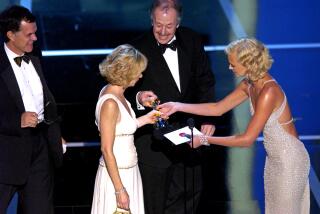Toronto Film Festival: ‘Imitation Game’ wins people’s choice award
“The Imitation Game” has won the Grolsch People’s Choice Award at the Toronto International Film Festival, cementing its status as an Oscar-season front runner.
Morten Tyldum’s WWII-era drama stars Benedict Cumberbatch as eccentric scientist Alan Turing, who helped defeat the Nazis by devising a new code-breaking machine. Weinstein Co. will release the film on Nov. 21, and is expected to campaign heavily for award nominations for Cumberbatch, Tyldum and co-star Keira Knightley as well as the film as a whole.
The company receives a significant boost from Sunday’s news. Toronto’s top audience award (the festival does not hand out any jury prizes), is a fairly reliable indicator of a movie’s awards prospects.
Five of the past six people’s choice winners at the Toronto festival landed a best-picture Oscar nomination (only Nadine Labaki’s “Where Do We Go Now?” in 2011 failed to make the grade) and three of the six won best picture (“Slumdog Millionaire,” “12 Years A Slave” and Weinstein’s “The King’s Speech;” indeed “Imitation Game” has drawn comparisons to that film on thematic and other grounds).
Still, some pundits have felt that the race this year has lacked a juggernaut. And momentum out of Toronto doesn’t always carry over all the way to the big dance -- “Up in the Air” was the consensus breakout in 2009 but didn’t wind up with any Oscar wins.
TIFF organizers on Sunday also announced a number of other awards. The people’s choice prize in the documentary category went to Sudanese filmmaker Hajooj Kuka’s “Beats of the Antonov,” about the war-torn residents of the Blue Nile and Nuba Mountains in the director’s home country.
Meanwhile, the people’s choice award in the genre-driven Midnight Madness section went to New Zealand comedy maestros Taika Waititi and Jemaine Clement for their vampire mockumentary “What We Do in the Shadows.” The film will be distributed in the U.S. by upstart company Orchard.
Audiences handed the award for best Canadian film to Maxime Giroux’s “Felix and Meira.” The multilingual movie, about the relationship between a Hasidic woman and secular man, will be released by Oscilloscope next year.
The group of international critics known as FIPRESCI also handed prizes to Abd Al Malik for “May Allah Bless France!” and Oren Moverman for “Time Out of Mind” as the best of their respective festival sections.
TIFF, an 11-day gathering that is among the film world’s most crucial confabs, winds up Sunday. A number of performances asserted their award candidacies during the fest. In addition to Cumberbatch, they include Eddie Redmayne (“The Theory of Everything”), Bill Murray (“St. Vincent”) and Steve Carell and Channing Tatum (“Foxcatcher). Reese Witherspoon (“Wild”) and Felicity Jones (“Theory of Everything”) were among the female performers with buzz in a somewhat thinner lead actress field.
The momentum on the actress side is suddenly with Julianne Moore. Moore, who stars in the Alzheimer’s drama “Still Alice,” went from a non-factor to a front-runner in the matter of a few days after her film screened to rave reviews and Sony Pictures Classics acquired rights to the picture with plans to drop it into this year’s campaign.
As for “Imitation Game,” Cumberbatch told The Times that he believed the film would popularize the legacy of Turing, who in addition to cracking the Nazis’ Enigma code also created a key test for artificial intelligence while leading a tragic personal life as a gay man in an environment hostile to homosexuality. “I think it’s just astonishing considering his level of achievements and what he stands for that he is relatively obscure,” Cumberbatch said.
More to Read
From the Oscars to the Emmys.
Get the Envelope newsletter for exclusive awards season coverage, behind-the-scenes stories from the Envelope podcast and columnist Glenn Whipp’s must-read analysis.
You may occasionally receive promotional content from the Los Angeles Times.







